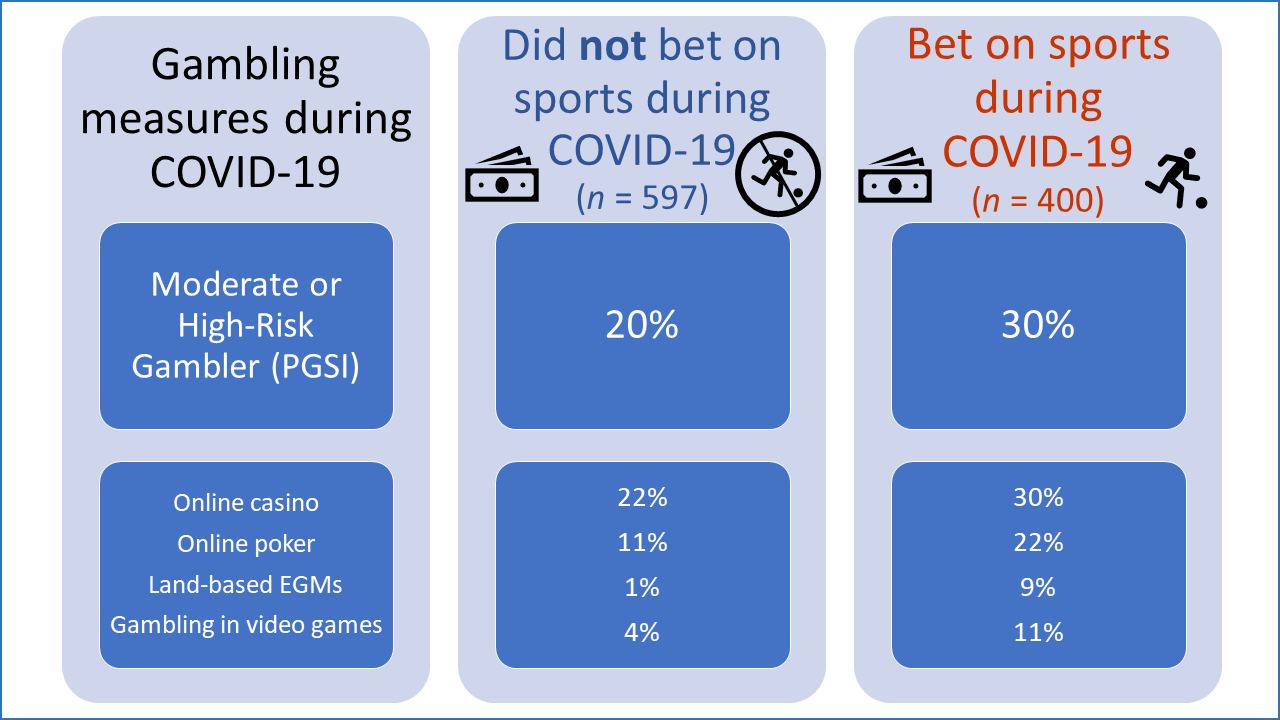The WAGER, Vol. 25(11) – What are the characteristics of people who continued to gamble during the COVID-19 pandemic?
The COVID-19 pandemic has sickened over 40 million people worldwide and has caused over 1 million deaths. Beyond its direct consequences, the pandemic has had adverse effects on psychological health, with negative implications for addictive behaviors. For gambling in particular, scholars have raised concerns about worsening gambling-related problems as a result of social isolation, financial stress due to job loss, death or illness among loved ones, and mental distress due to fear of contracting the virus. In this week’s WAGER, we review a recent study by Anders Håkansson that examined gambling behaviors and gambling-related problems among Swedish people who continued to gamble during the COVID-19 pandemic.
What were the research questions?
Are there differences in gambling behavior and gambling-related problems among those who gambled during the pandemic compared to those who didn’t? Do these differences vary for sports and non-sports gamblers?
What did the researchers do?
The researcher collected self-report survey data between May 5-12, 2020 from 997 Swedish residents who were members of an internet survey panel and reported gambling on sports or online casino games more than 10 times during the past year. Each participant was asked to report: 1) the frequency of different types of gambling1 in the past 30 days2 and past year; 2) risk for problem gambling as measured by the Problem Gambling Severity Index (PGSI); 3) whether they had taken part in the nationwide voluntary self-exclusion program; and 4) demographic characteristics, including gender, age, family structure (i.e., living alone vs. not alone); and occupation. The author reported descriptive statistics for each measure and used Chi-square tests to compare people who reported involvement in each type of gambling during the pandemic (i.e., past 30 days) with those who reported involvement in each type gambling only before the pandemic (i.e., past year but not during the past 30 days).
What did they find?
The sample was mostly male (75%) and 7% of respondents reported having taken part in the voluntary self-exclusion program in the past. Study participants varied in their risk for problem gambling, with 52% screening as no risk, 23% as low risk, 15% as moderate risk, and 10% as high risk. Participants who gambled in land-based casinos, or on electronic gambling machines, or who bet on sports during the pandemic were more likely to be moderate or high risk gamblers than those who didn’t gamble in these ways during the pandemic. Those who gambled on sports during the pandemic were more likely to have a history of indebtedness and to have more gambling-related problems than those who did not gamble on sports during the pandemic (see Figure), yet they were not more likely to have voluntarily self-excluded. Pandemic sports bettors also played a greater variety of game types, which can also be a marker for potentially elevated risk from gambling.

Figure: Key findings on sports gamblers from survey during COVID-19 in Sweden (total n = 997). Percentages shown were calculated separately for each group (i.e., non-sports bettors and sports bettors). All differences were statistically significant. For the four gambling involvement measures in the bottom left panel, percentages indicate any involvement during the pandemic greater than none for each group separately. Click image to enlarge.
Why do these findings matter?
This study has important implications for public health policy related to gambling during COVID-19 and could be used to improve responsible gambling programs. For example, the finding that those who continued to gamble on sports during the pandemic are particularly at risk could encourage gambling operators to develop programs to provide personalized feedback about spending and encourage safer gambling practices (e.g., keeping a budget and setting limits) for this population. Because continuing to bet on sports seems to be a marker for gambling risk, clinicians might want to ask about specific kinds of gambling involvement while developing targeted and innovative treatment methods.
Every study has limitations. What are the limitations in this study?
The study used a self-report methodology, so participants might have made errors in describing their gambling behaviors. This was not an experimental study, so we cannot conclude that continuing to bet on sports during the pandemic created gambling-related problems.
For more information:
Are you worried that you or someone you know has an addiction? The SAMHSA National Helpline is a free treatment and information service available 24/7. For more details about addiction, visit our Addiction Resources page.
Health professionals and addiction specialists have been increasingly focused on mental health as it pertains to COVID-19. They have assembled resources specific to COVID-19-related concerns, as well as resources on addictive behaviors in general, which can be found on the National Institute on Drug Abuse and Centers for Disease Control and Prevention websites.
— Eric R. Louderback, Ph.D.
What do you think? Please use the comment link below to provide feedback on this article.
________________
[1] The types of gambling that were measured included: 1) in-game sports betting, 2) pre-game sports betting, 3) online casino betting, 4) land-based casino betting, 5) online horse betting, 6) land-based horse betting, 7) online poker, 8) land-based poker, 9) land-based electronic gambling machines (i.e., slot machines), 10) online bingo, and 11) gambling within video games.
[2] Because the survey was administered in May 2020 and initial COVID-19 restrictions began in March-April 2020, the “past 30 days” measure of gambling involvement examines gambling behavior during the pandemic period.